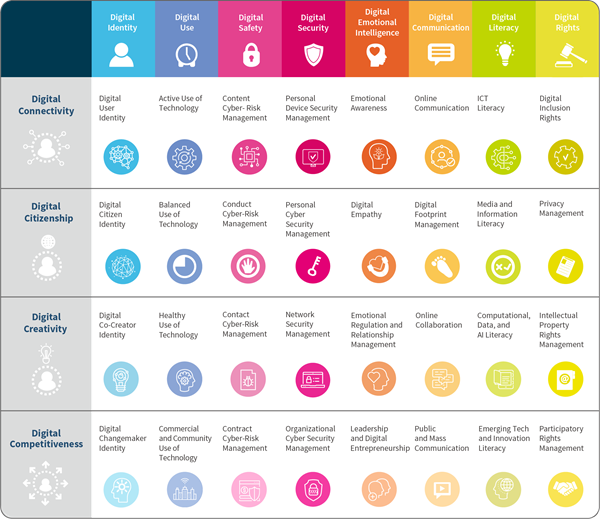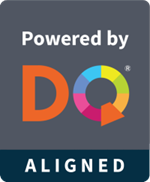Recently, the DQ Lab certified the TechnoKids program and awarded it the Powered by DQ Seal. This signifies that TechnoKids Curriculum Collections align with multiple digital intelligence competencies within the DQ Global Standards (IEEE 3527.1TM). As a result, teachers can feel confident knowing that TechnoKids has received independent accreditation for teaching digital intelligence and achieving internationally recognized standards.

What Is Digital Intelligence?
Digital intelligence, or DQ for short, are the social, emotional, and cognitive abilities people need to thrive in an ever-changing digital world. The DQ Institute provides a taxonomy which organizes digital knowledge, skills, and attitudes into a framework. The framework includes 32 competencies which are essential for a fulfilling digital life. Digital intelligence is organized into eight areas of competency. Each of these areas can be achieved at four developmental levels. Therefore, a comprehensive digital literacy program must contain instructional materials that help students achieve a benchmark of skill attainment in all of these areas and levels.

DQ Lab and TechnoKids Alignment to DQ Global Standards
The DQ Lab is an independent, reputable organization. Recently, they put all four TechnoKids Curriculum Collections under an extensive review. The results certify that the TechnoKids program aligns to all 4 DQ levels, all 8 DQ areas, 19 competencies, and over 50 microcredentials (GSMs). The DQ Lab has officially approved the TechnoKids program to carry the seal ‘Powered by DQ’.

How DQ Lab Evaluates a Program
It is important to understand how the DQ lab evaluated TechnoKids Curriculum Collections. Earning approval is a rigorous process. It is not enough for a product to share a bit of knowledge or introduce a skill once or twice. This is insufficient. Rather, an education program must achieve a certain depth and breadth to validate that students will attain competency in a specific area.
Measure the Coverage of DQ Competencies
When DQ Lab reviews an education program, the method they use to determine if a product aligns to a competency is to count and categorize learning messages. A learning message is a significant point in an assignment that targets a DQ competency. To earn a DQ seal a program must have repetition of learning messages as this is necessary for students to gain mastery.
Categorize Learning Messages to Measure the Depth of Content Coverage
Next, DQ Lab examines each learning message to determine if it aligns with a Digital Intelligence Global Standards Microcredential (GSM). A GSM is a micro learning block, which is an individual learning objective. For example, the competency of Digital Citizen Identity has multiple micro learning blocks. These blocks relate to topics such as digital integrity, global digital citizenship, and demystifying AI tools, just to name a few. To earn a DQ seal, learning messages must target multiple micro learning blocks within a specific competency.
Analyze Learning Messages and GSMs To Calculate the Breadth of Content Coverage
In the final step of the DQ Lab evaluation, a proprietary algorithm analyzes the data. It determines for each competency if there are a sufficient number of learning messages in the program that align to GSMs. The threshold for approval is unknown. However, our experience shows that content must have students revisit a competency multiple times, in many different ways to earn alignment.
TechnoKids Curriculum and DQ Standards
Undoubtedly, with the ‘Powered by DQ’ alignment, you can be assured that TechnoKids Collections promote digital intelligence. At TechnoKids, our mission is to combine education and technology to provide children with the core computing skills that will best prepare them for the future. You can be confident that our curriculum achieves that goal.
